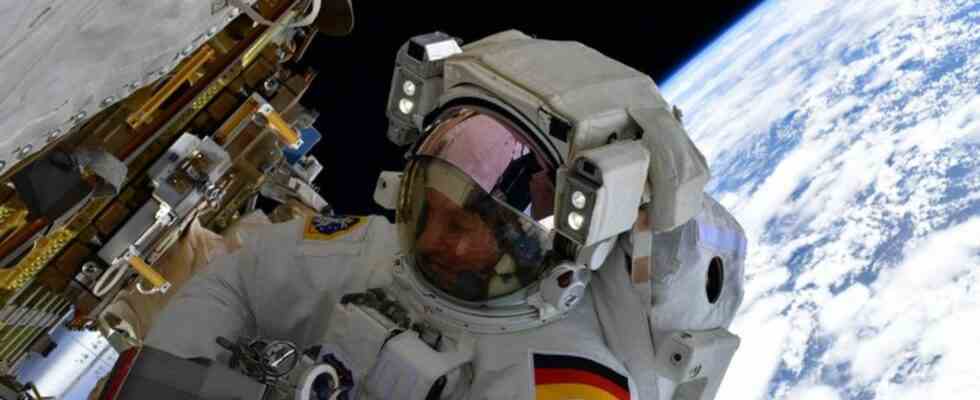space travel
“I still have many dreams”: Astronaut Maurer comes home
The German astronaut Matthias Maurer was also allowed to take part in an external mission on the ISS. Photo: NASA/ESA/dpa
© dpa-infocom GmbH
The last extraterrestrial hours are running for Matthias Maurer. After almost six months in weightlessness, it’s time to return to earth. What remains of the mission of the twelfth German in space?
Racing around the world at around 28,000 kilometers per hour for the last time, a farewell look at sparkling cities – then it’s over for Matthias Maurer.
After almost six months in space, the German ESA astronaut will return to earth in the coming days, the exact date was initially unclear. A few hours after undocking from the space station, the “Crew Dragon” capsule will land in the water off the US coast. With the mission, he has fulfilled a dream, says the 52-year-old. And now? “I still have a lot of dreams,” says Maurer. But these dreams are different. “I don’t necessarily have to surpass this in terms of size.”
“Space WG” with Russians and Americans
Behind the Saarlander lies an intensive business trip into weightlessness. In the midst of the most severe tensions between the West and Moscow over the Ukraine war, Maurer conducted research in the “Space WG” with Russians and Americans. From a distance of 400 kilometers he noticed large plumes of smoke while flying over the Ukraine. The tensions also affect the space station itself: Russia has recently left the future open for its part of the flying laboratory for the period after 2024. The USA is aiming for a term until at least 2030. It is unclear whether and when the next German will work there.
The flights to the ISS are not without controversy. Too expensive, too bad for the environment, too ineffective, say critics. Maurer, the twelfth German in space, doesn’t see it that way. “Above all, I want to inspire children, young people and students to remain curious, to ask questions and to say: I can do that too,” says the astronaut from the European space agency ESA. “If I succeed, my mission for Germany and for mankind was a great success.”
Space station place for important experiments
Other advocates also emphasize that for the equivalent of two euros per year per German citizen, important experiments on future technologies that would not be possible on earth were carried out on the space station. And there is something else: for more than 20 years, international cooperation has been going on at the station, despite earthly conflicts. The station is often celebrated in space circles as an “Enterprise of the 21st Century” – based on the spaceship of the same name from the cult TV series, on which many nations and cultures work together.
Maurer traveled to the International Space Station on November 11 with three colleagues from the US space agency Nasa. On the outpost of mankind he was involved in more than 100 experiments, 34 of them from Germany, under the substantial organization of the German Aerospace Center (DLR). And Maurer got out into space for almost seven hours of work. Planning the mission was also a huge challenge because of the pandemic.
Maurer as the fourth German on the ISS
Maurer was the fourth German on the ISS. His predecessor Alexander Gerst was felt to be more in the public eye. “Astro-Alex” researched just as seriously as Maurer, but at the same time shaved the bald head of a US colleague after losing a bet and humorously dedicated “my next eleven orbits around the world” to the German footballers after winning the 2014 World Cup. Mason is different. At 52, the man with a doctorate in materials science is also the oldest German astronaut on a maiden flight. In addition, the war on Earth was not exactly a reason for slapstick in the cosmos.
Maurer looks forward to many things on earth, such as fresh salad. The days before the return are a “moment of sadness,” says German astronaut Reinhold Ewald. “You do everything for the last time on board the ISS. When you look at the earth, you let everything pass silently in front of you. With this sentiment you absorb everything again.” Ewald flew to the Mir space station in a Russian capsule in 1997 and did research there for three weeks.
Landing planned off the coast of Florida
At the end of his mission, things will go quickly for Maurer. After undocking, the “Crew Dragon” capsule from the US company SpaceX enters the earth’s atmosphere and is continuously slowed down by air friction. This massive force holds Maurer and three other returnees in their seats until parachutes further slow the fall and allow for a gentle splashdown – usually off the Florida coast, but there are other possible landing zones depending on the weather.
On Earth, a well-established rescue team helps the returnees. “It starts with the sunglasses, which have to protect the eyes after months of artificial light, to the drinking water because the returnees are exhausted,” says Ewald. Maurer is expected in Cologne the very next day. Then, among other things, there are medical tests – and a happy reunion with family, friends and relatives.

